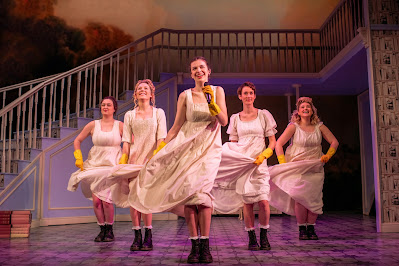Reviewed by James Karas
Playwright Charles Josephine’s Cowbois, now playing at the Royal Court Theatre in London is, according to a note in the program, “a love letter to the trans masculine people in history whose stories have been ignored or erased.” The play takes place in a saloon run by Miss Lillian (Sophie Melville) in 19th century United States. In the saloon we meet several of her women friends and other characters. All the husbands are away for a year prospecting for gold.
Miss Lillian has some interesting woman friends. They are Sally Ann (Emma Pallant), Jayne (Lucy McCormick), Lucy (Lee Braithwaite), and Mary (Bridgette Amofah). A drunk Sheriff Roger Jones (Paul Hunter) arrives, and we learn that he is looking for a criminal called Jack Cannon (Vinnie Heaven). He is a singing cowboy dressed in gaudy clothes, not so much a cowboy as a caricature of one. He sings, dances or gyrates his torso and causes a sensation not just with the ladies but with the audience who react to him as if he were a rock star.
The ladies do not allow the speaker to finish a sentence and they act and overact with frightful consistency. Some are hot and fan themselves with great vigor, they are religious and cross themselves regularly and create an atmosphere that the audience found hugely entertaining. The heat that the fans which they use so vigorously are supposed to relieve soon seemed to be more sexual than weather-related.
 |
| The cast of Cowbois. Photo: Ali Wright |
The Sheriff acts and overacts in an equally showy and ridiculous manner. The ladies’ husbands, as I said, have been away for a year gold-prospecting somewhere and anything can happen. The handsome rock-star style Jack and Miss Lillian are attracted to each other and engage in protracted simulated coitus including finding a hot tub on stage. Yes, she becomes pregnant, and we see her with a grown belly for the rest of the show.
We are informed that Jack has
committed an extremely wide range of crimes including murder, armed robbery,
perjury bigamy, extortion, and a few others. He is a deadly shot and shoots enough
bullets that combined with the shots of the other characters would wipe out a
whole town. Remember, this is a rootin’ shootin’ western.
The husbands return from their prospecting, and they do not raise the atmosphere of silliness. I am not sure what Josephine as the author and co-director with Sean Holmes had in mind. Is the play a parody, a satire, a burlesque about westerns with LGBTQ themes? Yes, we do get the message about lesbians, transexuals and people of different sexual orientations. In fact, the author states that if the character is trans, so must the actor, if the character is queer, so must the actor.
There are plenty of guns and lots of shooting (almost too much) and the saloon and some of the costumes and the presence of guns indicate a western setting, of course. But all the actors speak with their own English accent and if you are looking for a western, you are in the wrong theatre.
There is some singing by the women and Jack picks up a microphone that is lowered from above or a microphone stand and sings what sound like ordinary tunes but neither he nor the ladies overdo it. Thank you.
The set by Grace Smart shows a western saloon with the addition of a bathtub that is revealed with the removal of some floorboards for the sexual activity. This is where Jack and Miss Lillian consummate their love at some length.
The farce or burlesque is tamer
in the second half when the men return from their prospecting but not by much. In
all the tomfoolery we do get the laudable message about the treatment of
non-binary people, but I cannot pretend to have enjoyed the play or the
production. I do not hesitate to mention that a large part of the audience followed
the performance with rapt attention, boisterous laughter and gave the players
an enthusiastic standing ovation. I don’t know what they saw in it.
_________
Cowbois by Charlie Josephine in a production by the Royal Shakespeare Company, continues until February 10, 2024, at the Royal Court Theatre, Sloane Square, London SW1W 8AS. www.royalcourttheatre.com




